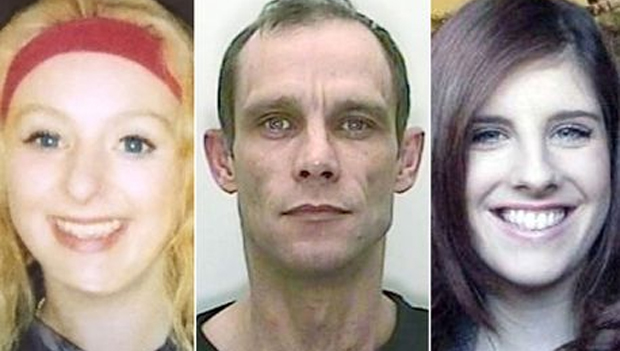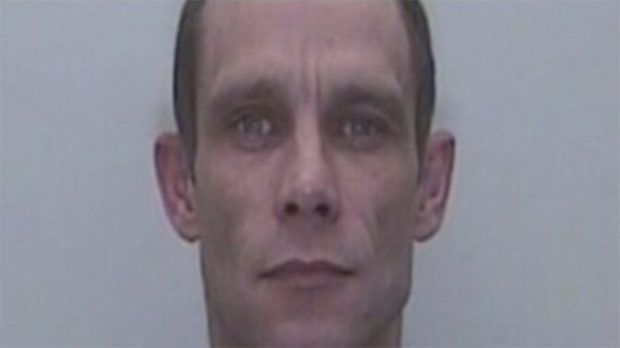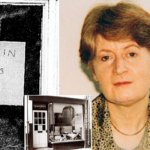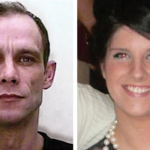The Breaking of Detective Superintendent Fulcher
by TIM HICKS
~~~~~
Introduction
I bought “Catching a Serial Killer”, by former Detective Superintendent Stephen Fulcher, to research the disappearance of Miss Claudia Lawrence in York. It covers the police investigation into the disappearance of Miss Sian O’Callaghan. Detective Superintendent Steve Fulcher was the Senior Investigating Officer (SIO) who led the investigation codenamed Operation Mayan that resulted in Christopher Halliwell’s conviction for the murder of Miss O’Callaghan, the murder of Miss Becky Godden Edwards and the destruction of Detective Superintendent Stephen Fulcher’s career.

Serial Killer Christopher Halliwell (Centre) and his two known victims
Miss Becky Godden-Edwards and Miss Sian O’Callaghan.
“Catching a Serial Killer” was such an important work that I wanted to review it. However, it is a much weightier work than could be covered, in a one thousand word book review, so the NYE agreed to cover it in a 5-part series:
The NYE Christopher Halliwell Series
- The breaking of Detective Superintendent Stephen Fulcher – by Tim Hicks
- Book review: “Catching a Serial Killer” – by Tim Hicks
- Christopher Halliwell and Peter Sutcliffe – by Chris Clark & Tim Hicks
- Christopher Halliwell: The Secret Murders – by Chris Clark & Tim Hicks
- Christopher Halliwell: Did he murder Claudia? – by Chris Clark & Tim Hicks
I will cover the investigation into the disappearance of Miss Sian O’Callaghan in part 2 of the trilogy.
Halliwell’s arrest, March 2011
Miss O’Callaghan’s disappearance was a “crime in action”:
“A crime in action is one in which an individual’s life is at threat as a consequence where a victim’s life is at threat as a consequence of an ongoing course of conduct by a perpetrator which creates that threat. Typically they are abductions because, should we not be able to find the victim, the consequences can be loss of life.”
Fulcher’s priority throughout was the safe recovery of Miss O’Callaghan, as required by the ACPO Kidnap Manual.
Fulcher placed Halliwell under surveillance. Seventy-two hours after her abduction (beyond which a human cannot survive without water), Fulcher proceeded on the basis that the victim was still alive but her captor was taking food and water to her. He ordered that a series of measures be taken to pressurise Halliwell to visit the location where he was holding Miss O’Callaghan. The intention being to follow Halliwell and release Miss O’Callaghan.
Fulcher was then forced to order Halliwell’s arrest, because surveillance information indicated he may be about to commit suicide.
Code C of The Police and Criminal Evidence Act 1984, (PACE) which is a Code of Practice requires that an arrested person must be cautioned, taken to a police station and given access to a solicitor before being questioned. However Section 11.1 of PACE allows these requirements to be waived and for an “Urgent Interview” to be conducted if not doing so would lead to “harm to other people” or to “preserve or prevent a loss of evidence”.
Accordingly, Halliwell was arrested for kidnapping Miss O’Callaghan and cautioned. Proceeding on the basis that Miss O’Callaghan was still alive, the arresting officers conducted a recorded first “Urgent Interview” in a police car to ascertain the location of Miss O’Callaghan.
Halliwell refused to comment.
If Miss O’Callaghan was still alive but imprisoned, Halliwell’s silence would ensure her death. So Fulcher ordered that Halliwell (who was en route to a police station) be taken to the approximate area where he suspected Miss O’Callaghan was being held. Fulcher travelled there and conducted a second “Urgent Interview” with Halliwell.
Fulcher did not caution Halliwell or question him at a police station in breach of PACE, because if he did, he believed Halliwell would maintain his silence. The second urgent interview was successful and Halliwell took Fulcher to Miss O’Callaghan’s body. Fulcher did not arrest Halliwell for the murder of Sian O’Callaghan breaching PACE again.
Halliwell then confessed to another murder and offered to take Fulcher to another body. Fulcher allowed Halliwell to take him to the site where he had buried Miss Becky Godden-Edwards without cautioning Halliwell again, arresting him for the second murder or taking him to a police station. Because if he did so he believed, Halliwell would then refuse to cooperate further.
Fulcher’s justification for breaching PACE was:
- The victim’s right to life under article 2 of the Human Rights Act took precedence over PACE.
- Since 1984, there had been nine amendments to PACE arising from operational experience and that they were guidelines, not law. Consequently, he concluded that should in extremis the situation warrant it, he had discretion to breach PACE.
- His actions were compliant with PACE because he was acting to find Miss O’Callaghan and to find a second body to preserve it as evidence.
Halliwell was then taken to a police station and provided with a solicitor. A PACE-compliant interview process then took place, during which Halliwell refused to answer any more questions.
It later transpired that Fulcher’s media strategy of using press releases to pressurise Halliwell into going to Miss O’Callaghan had worked brilliantly. Halliwell had visited the original site where he had left the body to move it. Unfortunately, this occurred when the surveillance team had lost contact with him.
Halliwell’s pre-trial meeting in January 2012
At a pre-trial meeting in January 2012 to consider the admissibility of evidence, Halliwell’s barrister argued:
- All of the evidence obtained from the moment PACE was breached was inadmissible.
- Fulcher had put too much information in the public domain through the media and had consequently made it impossible for Halliwell to have a fair trial.
Her Honour Mrs Justice Cox ruled:
- The evidence against Halliwell obtained after his arrest should be declared inadmissible because Fulcher had breached PACE. This prevented Halliwell being tried for the second murder of Miss Becky Godden-Edwards. The CPS did not challenge this ruling.
- Fulcher’s media strategy constituted “a serious error of judgment”, but he was not acting in bad faith and Halliwell’s right to a fair trial had not been prejudiced.
Suspension September 2012
The inadmissibility ruling resulted in severe criticism of Wiltshire Police in the media. Fulcher had at that time left Wiltshire Police for the National Crime Operations Support Team (NCOST).
Becky Godden-Edwards’ father made a complaint that Fulcher’s conduct had denied his daughter justice.
Fulcher expected the complaint to be rejected because it was so that only by breaching PACE had he been able to locate the body of Miss Godden-Edwards, who had not even been reported missing. Had he not done, so her body would not have been found and her murder would probably remain undetected. However, Wiltshire Police immediately referred the complaint to the Independent Police Complaints Commission (IPCC). Whereupon Fulcher was immediately sacked from the NCOST. Effectively punishing him for being referred to the IPCC.
He returned to Wiltshire Police with a feeling of being in disgrace.
In September 2012 Fulcher was suspended from duty, his laptop, ‘phone and warrant card were seized and he was escorted home. Quoted in The Telegraph, barrister and MP Michael Ellis said:
“I am concerned that Wiltshire police have felt it necessary to suspend this officer where he appears to have been behaving in an exemplary fashion. There should not be a knee jerk reaction without proper cause in circumstances where officers acted in good faith and have not tried to deceive. Where police officers have acted in order to achieve the proper ends of justice, their forces should take a more considered approach.”
Halliwell convicted
Halliwell was convicted of murdering Sian O’Callaghan in October 2012 and sentenced to twenty-five years imprisonment. He could not be given a full life term, because he had only been convicted of one murder. Channel 4 News report here.
Quoted in the Evening Standard in October 2012, Mr Robin Buckland QC MP called for PACE to be revised:
“But putting myself into his shoes for a moment, putting aside my legal hat having been a criminal barrister for 20 years, I can entirely understand that in the heat of the moment, when it was still thought that Sian O’Callaghan may still be alive, that that officer thought he was acting in the best interests of the safety of Sian and in the interests of finding out more from Halliwell.”
“The codes of practice are not tablets of stone, they are regularly updated in the light of experience….it is now time that we had another look.”
The IPCC investigation
The IPCC investigated three allegations:
- The failure of Fulcher to adhere to PACE (the original complaint by Miss Godden Edwards Father in May 2012) and that he obtained a confession from Halliwell by oppression.
And two additional charges by Wiltshire Police in November 2012:
- The release by Fulcher of information to the media after Halliwell’s arrest, alleged to be prejudicial to Halliwell’s right to a fair trial.
- Unauthorised contact between Fulcher and journalists.
The IPCC report (here) was released nine months late in September 2013. It found that there was a case for gross misconduct on all three charges. Publication was delayed because the CPS was asked to bring a criminal charge of misfeasance in public office against Fulcher. (The CPS found there was no case to answer).
Wiltshire Police proceeded with a misconduct hearing.
The misconduct hearing. January 2014
Charge 2 was withdrawn at the start of the hearing. Fulcher was convicted of gross misconduct on Charges 1 and 3, and punished with a written warning.
Statements issued at the conclusion of the hearing are here.
Resignation
Fulcher asserts in the book that he believed he was “persona non grata” at Wiltshire Police and felt isolated. This affected his health and marriage. He had tried to transfer to other forces, but his applications were rejected.
After discussion with his wife, he resigned from the police in 2014, rather than carry on under the conditions he was serving under. His resignation resulted in the loss of his final salary police pension, worth about half a million pounds.
Fulcher’s personal views are narrated very well in this Guardian article by Tim Lewis
Halliwell’s trial for the murder of Becky Godden-Edwards. September 2016
In 2016, the CPS challenged the ruling that the evidence against Halliwell obtained after his arrest was inadmissible because Fulcher had breached PACE. Fulcher assisted the CPS by attending a new pre-trial hearing for the murder of Miss Godden-Edwards. It was heard by His Honour Sir John Griffith Williams, who overturned Mrs Justice Cox’s ruling and allowed all of the evidence obtained by Fulcher to be heard.
Halliwell was convicted of the murder of Miss Godden-Edwards and sentenced to a full life term.
In his judgment, His Honour Judge Griffith Williams said to Halliwell:
“You briefly allowed the little conscience you had to prompt your confession. But for that confession, there is every prospect that Rebecca’s remains would not have been found. I am satisfied that the confession to the murder of Becky was not the consequence of oppression.”
My personal view
Being a civil libertarian that believes in adherence to procedures I was not sympathetic to Fulcher. This changed as a result of researching his case. I now feel sympathetic because:
Arrest and interview of Halliwell
- In accordance with PACE Halliwell had already been arrested and cautioned prior to the “Urgent Interview”:
“You do not have to say anything, but it may harm your defence if you do not mention when questioned something which you later rely on in court. Anything you do say may be given in evidence.”
- Halliwell was not a vulnerable person and understood the arrest process from previous convictions. The caution is clear. I believe he knew that he did not have to say anything and that any information he volunteered could be given in evidence against him in connection with any offence.
- Fulcher had meticulously prepared for interviewing Halliwell with a PACE compliant “Urgent Interview” in connection with the O’Callaghan murder. The possibility of Halliwell confessing to another murder could not have been foreseen. Consequently Fulcher was unprepared and having to making decisions alone in a complex, developing, life and death situation, without the benefit of advice from senior colleagues.
- Fulcher was operating in an extraordinary and unprecedented situation where there was uncertainty about the application of PACE. After the arrest, the Chief Constable issued a force wide message to say how “brilliantly” managed the enquiry was: “I particularly extend my thanks to Detective Superintendent Steve Fulcher for the bold and confident approach to the investigation.” Confirming that senior officers believed Fulcher’s actions were appropriate.
IPCC investigation
- The IPCC found that “that Mr Godden’s complaint that Det Supt Fulcher’s actions led to the murder charge in respect of Rebecca being dropped is upheld.” It is now clear that the charge was dropped because of a ruling on admissibility of evidence that was in error and because the CPS did not challenge the ruling at the time. A failure of the legal system, not of Fulcher.
- The IPCC investigation states that “Det Supt Fulcher stated had he not proceeded as he did, Rebecca’s remains may never have been found. However, it is not possible to determine what may or may not have happened if Mr Halliwell had been immediately conveyed to custody after his arrest and urgent interview by detectives”. There is no doubt that Fulcher’s actions resulted in the recovery of the body and Halliwell’s subsequent conviction. The possibility of Halliwell suddenly confessing to a murder, having been advised by a solicitor not to, appears to me to be remote.
- The IPCC report states that Fulcher’s reasons for breaching PACE were “not relevant”. They clearly were.
Misconduct hearing: General
- Wiltshire Police excluded the public from the hearing and held it in camera. This is now prohibited, to ensure that the system is “accountable and transparent”.
- Charge 2 was dropped at the start of the misconduct hearing. Fulcher nevertheless had the stress and expense of preparing to face a charge, which should never have been brought and should have been dropped much earlier in the process.
- All of Fulcher’s actions had been endorsed by senior officers on the Operation Mayan Gold Group, who bore responsibility for Fulcher’s actions. However, Wiltshire Police did not refer any of them to the IPCC and the IPCC did not recommend misconduct proceedings against them.
- Wiltshire Police did not give full disclosure of all evidence. Fulcher’s recommendation for the Queen’s Police Medal (QPM) in 2011 for his leadership of Operation Mayan was withheld. When he asked for the Operation Mayan Gold Group Policy File he was told: ‘It’s gone missing, believed stolen from the chief constable’s office.’
Charge 1 The failure of Fulcher to adhere to PACE including that he obtained a confession from Halliwell by oppression
- It is now clear from the ruling of His Honour Sir John Griffith Williams that Fulcher was not oppressive or responsible for the charge of murdering Miss Godden Edwards being dropped.
- Fulcher obtained a copy of a 2011 recommendation for the QPM for his leadership of Operation Mayan from a whistle-blower within Wiltshire Police:
“There is no doubt that without his direct intervention and engagement with the suspect, the bodies of both young women would not have been located”. …This is but a flavour of his remarkable and sustained contribution”….[He is] “a man of integrity, whose achievements not only enhanced the reputation of Wiltshire Police but upheld and demonstrated the best traditions of British Policing.”
This evidence demonstrated that Fulcher’s actions were believed to be appropriate and approved of by senior officers of Wiltshire Police at the time they were taken. (After the hearing Wiltshire Police investigated how the QPM nomination was leaked to Fulcher and commenced disciplinary action against a member of staff, who resigned).
- Evidence was given that Her Honour Lady Justice Cox and Halliwell’s barrister had both agreed in court that Fulcher’s actions were not a misconduct issue.
Charge 2: that Fulcher had released information to the media alleged to be prejudicial to Halliwell’s right to a fair trial after Halliwell’s arrest
- After extensive cross examination and hearing legal argument, Her Honour Mrs Justice Cox had already found in Court in 2012 that Fulcher’s media strategy constituted “a serious error of judgment”, but he was not acting in bad faith. Making an error of judgment is not gross misconduct.
- Fulcher suggests that the reason Charge 2 was dropped at the start of the hearing was that senior officers in the Operation Mayan Gold Group had approved his actions, including the media strategy, making them complicit.
Charge 3: Unauthorised contact with journalists
- Fulcher was accused of breaching a judicial order. At the misconduct hearing Wiltshire Police admitted that it had misunderstood the judicial order. In fact no order had been made to prevent the police speaking to journalists.
Charge 4: that Fulcher had been dishonest
- Wiltshire Police tried to introduce a fourth charge towards the end of the hearing without any warning. The panel very properly unanimously refused to hear it.
I do not believe that Charges 3 and 4 would have been brought in isolation. The impression given is that they were brought to bolster a weak case on Charges 1 and 2.
Overall
I have no doubt that there was anger within the force at the criticism of Wiltshire Police in the national press over this high-profile case. However, other than Fulcher, no senior police officer has been held accountable or faced any criticism over the role they played in Operation Mayan; or for their approval of Fulcher’s actions at the time.
Fulcher’s has strong views on senior police officers:
“There are a lot of people who have got to quite senior positions without ever conducting a major crime enquiry, strange as that may appear. That was just one reason why I didn’t want to join their club. I had always been driven by the need to catch criminals. To my mind most senior echelons in policing today weren’t police officers at all, they were merely puppets blowing with the political wind”.
I suspect his views were known and this, plus his criticism of Wiltshire Police for failing to investigate other offences that Halliwell may have committed, may have alienated him from the hierarchy of Wiltshire Police.
I am therefore concerned that this may have coloured the judgment of some senior officers in referring him to the IPCC, then proceeding with a misconduct hearing. Particularly as some of them may have had a conflict of interest over their own participation in Operation Mayan.
The issues arising from Fulcher’s case

Former Detective Superintendent Stephen Fulcher “a man of integrity, whose achievements not only enhanced the reputation of Wiltshire Police but upheld and demonstrated the best traditions of British Policing”
- PACE has still not been revised. So this situation could conceivably arise again, putting another SIO in the same position of choosing between his career, or convicting a serial killer.
- I wrote to the IPCCs successor body, the Independent office of Police Conduct (IOPC) and Wiltshire Police asking if there was a case for reviewing the conclusions of the IPCC report in the light of this fresh evidence. The IOPC responded promptly with an exceptionally clear statement:
The role of the IPCC (now IOPC) investigator in reaching conclusions is to give their opinion on whether there is a case to answer for misconduct or gross misconduct based on the evidence. It is then for a police force to decide on and take forward any disciplinary proceedings. Wiltshire Police agreed with the investigator’s opinion that there was a case to answer for gross misconduct.
At a misconduct hearing in 2014, this was found by a panel proven for breaches of the Police and Criminal Evidence Act (PACE) and for ignoring force orders. We are not aware this outcome has been overturned.
Criminal court proceedings are a separate process to the police misconduct system. It was reported that Judge Griffith Williams ruled in 2016 that Halliwell’s confession could be presented to the jury, notwithstanding the breaches of the Code of Practice, which is not contrary to our findings.
As we have already indicated, we do not consider the subsequent proceedings have any bearing on the conclusion of our investigation which ended in 2013.”
Wiltshire Police did not comment.
The findings of gross misconduct against Fulcher will not be re-considered. I think this is an injustice.
- Fulcher is highly critical of the lack of interest in investigating other unsolved offences that Halliwell may have committed. His view accords with the observations of myself and Chris Clark on the Yorkshire Ripper. Our articles on this are below:
Yorkshire Ripper how many victims?
Sutcliffe or the “Harrogate Ripper”
“Nude in the Nettles”: Was it Sutcliffe?
The final word
I will leave the final word to Stephen Fulcher quoted in the Guardian after the Godden-Edwards murder trial:
I am very pleased that Karen Edwards has finally seen justice done for her beautiful daughter Becky, who was brutally murdered by Christopher Halliwell. She has fought a very dignified battle for the past five and a half years to bring Halliwell to court and she should not have had to. I hope she finds some comfort in this verdict. I thank Karen for her resilience and determination to obtain justice for her beloved daughter.
Halliwell is an evil and depraved violator of women. I did all I could to find an abducted girl, Sian O’Callaghan, in an effort to save her life; the first duty of a police officer.
I also recovered a second victim of Halliwell’s murder: Becky, returning her to her loved ones after eight years of their misery. I caught a serial killer, preventing any further girls being murdered.
I adhered to the ACPO kidnap principles. Halliwell had to be arrested as he was about to commit suicide. As the law stands, the expectation was that I should have prioritised Halliwell’s right to silence and legal protection over Sian O’Callaghan’s right to life.
I remain convinced that the action that I took in allowing Halliwell to take me to the bodies of both Sian and Becky, was the right and moral thing to do. In so doing, I felt that I correctly prioritised the human rights of the victims and their families, balanced against the rights of the perpetrator.
The stance that Halliwell has taken since his confession to both murders, as demonstrated during this trial, I believe vindicate the actions that I took. It is perfectly clear that, had I not acted as I did, neither Sian nor Becky would ever have been found and Halliwell would be free to abduct and kill other girls.
My actions are deemed by the police service to be acts of gross misconduct. The public will need to know how this can be, and what the police will do on behalf of their loved ones who are missing (over 300,000 missing people are reported to the police each year). When the extraordinary facts of this case are explained it is likely to lead to a public crisis of confidence in the competence and credibility of the police service.
Despite everything that has happened to me, I cannot regret the decisions that I took that day. Ultimately, that decision ensured the return of two beautiful young women, which bought comfort to their families and ensured that Halliwell has been duly convicted of both murders.
Now the trial is over and I am no longer a serving police officer, I am able to put these issues into the public domain for the first time. I would like to prevent any family having to suffer the same agony that Karen Edwards has had to endure. I want to ensure that any senior investigating officer, faced with crimes in action, is able to take the right decision without suffering the repercussions I experienced whilst performing my duty.
Wiltshire Police and the IOPC were provided with a draft of this article but chose not to comment on it.



























Comments are closed.